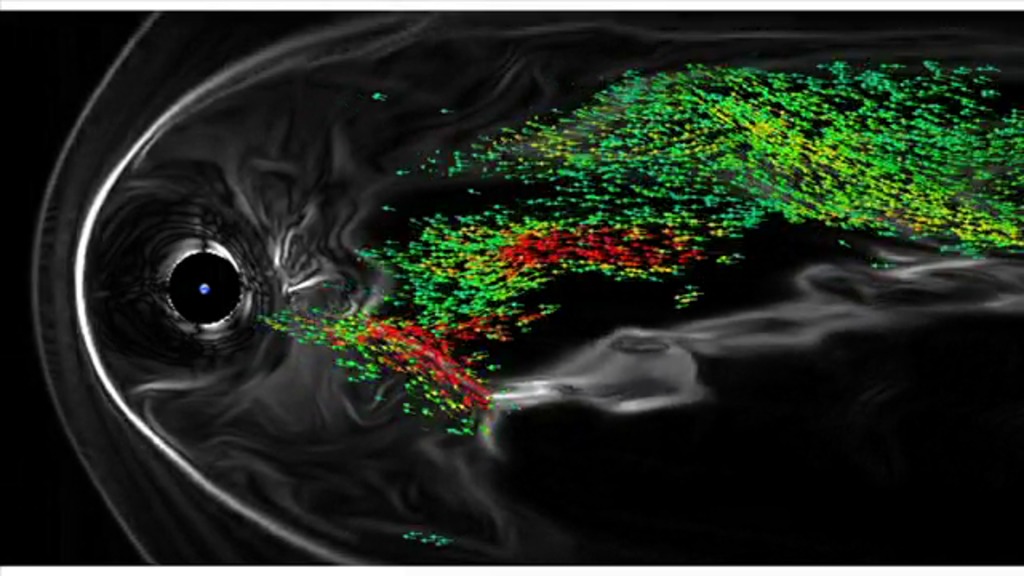ARTEMIS Mission
An extension to the THEMIS mission is to send two of the THEMIS satellites into lunar orbit to study the magnetospheric environment near the Moon. The new mission is named ARTEMIS (Acceleration, Reconnection Turbulence, and Electrodynamics of Moon's Interaction with the Sun).
The outermost two THEMIS spacecraft (Probes B and C) are on route to the Moon, where they will become the ARTEMIS mission's Probes 1 and 2 (red and green, respectively) , tasked with studying not only the tenuous cavity carved out by the Moon in the supersonic solar wind, but also reconnection, particle energization and turbulence in both the solar wind and the Earth's distant magnetotail at lunar distance. ARTEMIS stands for Acceleration, Reconnection, Turbulence, and Electrodynamics of the Moon's Interaction with the Sun.
Thanks to careful planning, sufficient fuel remained on both spacecraft at the successful completion of their primary mission to raise their apogees to lunar distance, where they could receive the multiple gravitational assists needed to fling the spacecraft first beyond the Moon and then assist them in entering in orbits that parallel that of the Moon at the L1 and L2 Lagrange points. Maneuvers in April 2011 enable the spacecraft to enter into prograde and retrograde lunar orbits (the 'braided' motion).
The direction of the Sun is indicated by the yellow arrow.
This movie is a visualization of the ARTEMIS mission from Earth orbit through its transfer to lunar orbit.

This visual opens with a view of the five THEMIS satellites in orbit around the Earth. Maneuvers have already boosted the apogee of THEMIS-B to the orbit of the Moon, and THEMIS-C is still in the process.

THEMIS-B gets a gravity assist from the Moon, sending it into an orbit above and below the orbital plane of the Moon. The ARTEMIS phase of the mission officially begins and the spacecraft are relabeled as such.

We move the camera into position with a better view along the Moon's orbit plane so we can get a better sense of the 3-D nature of the orbits.

A second lunar encounter for ARTEMIS-1 sends the spacecraft...

...far below the plane of the Moon's orbit,...

... preparing it for...

... yet a third gravity-assist from the Moon.

The camera pulls back, high above the Earth's north pole and the Moon's orbital plane. We see the lunar gravity-assist has sent ARTEMIS-1 far beyond the Moon. Meanwhile, ARTEMIS-2 is about to receive its first lunar gravity-assist.

Now ARTEMIS-1 & 2 maneuver through the space beyond the Moon, but not for long.

We move the camera back in, close to the Moon's orbit as ARTEMIS-1 & 2...

...maneuver to match their orbit with the orbit of the Moon. In this phase, they begin a gravitational dance between the lunar L1 & L2 Lagrange points.

We fade in the magnetopause, the outer boundary of the Earth's magnetosphere. With each orbit of the Moon, the ARTEMIS satellites pass through the magnetosphere with the Moon, sampling the interaction of the Moon with the electromagnetic environment.

We now move the camera into a position to 'chase' the Moon, to better observe the maneuvers which will complete ARTEMIS' capture by lunar gravity. The ARTEMIS trails are transformed into a coordinate system which travels with the Moon. To see an illustration of how moving coordinate systems impact the visualization of trails, see "LRO Transition from Earth-Centered to Moon-Centered Coordinates"

Looking down on the Moon far above its northern pole, we see both ARTEMIS spacecraft traveling around the Earth-Moon L1 point.

A couple of lunar orbits are completed in this configuration, passing into the Earth's magnetotail,

... and out.

ARTEMIS-1 completes its capture into lunar orbit,

...followed by ARTEMIS-2.

Now we move down towards the Moon's orbital plane for a close-up as ARTEMIS begins its lunar orbiting phase.

A view from below the Moon's orbital plane, where we seen the Moon's sunlit farside and the Earth's magnetosphere in the background.

As the Moon orbits behind the Earth, we're treated to a sunlit view of the nearside.

The Moon, with ARTEMIS in orbit, pass out of the magnetotail.

Posing for the camera: Earth, magnetosphere, Moon, ARTEMIS, the Sun.

Posing for the camera: Moon, ARTEMIS, the Sun.

A view of the Earth, magnetosphere, Moon, ARTEMIS, and the Sun, from inside the magnetosphere.

Sun, Moon, and ARTEMIS

The Moon and ARTEMIS about to pass into the magnetotail

Starting camera move close to the Moon

Close-up on the Moon with ARTEMIS orbits

Close-up on the Moon with ARTEMIS satellites (red & green spherical markers)
Credits
Please give credit for this item to:
NASA/Goddard Space Flight Center Scientific Visualization Studio
-
Animators
- Tom Bridgman (Global Science and Technology, Inc.)
-
Greg Shirah
(NASA/GSFC)
-
Video editor
- Scott Wiessinger (UMBC)
-
Producer
- Rani Gran (NASA/GSFC)
-
Scientists
- Vassilis Angelopoulos (University of California at Berkeley)
- David G. Sibeck (NASA/GSFC)
- Jeffrey Hayes (NASA/HQ)
Missions
This page is related to the following missions:Datasets used
-
SSCweb ephemerides (SSCweb)
ID: 538Satellite ephemerides
This dataset can be found at: http://sscweb.gsfc.nasa.gov
See all pages that use this dataset
Note: While we identify the data sets used on this page, we do not store any further details, nor the data sets themselves on our site.
Release date
This page was originally published on Wednesday, October 27, 2010.
This page was last updated on Wednesday, May 3, 2023 at 1:53 PM EDT.
